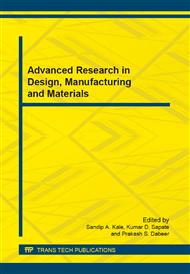[1]
Richardson, R.N., Butterworth, J.S., The Performance of Propane/Isobutane Mixtures in a Vapour Compression Refrigeration System,International Journal of Refrigeration, 18 (1995), pp.58-62
DOI: 10.1016/0140-7007(94)p3712-a
Google Scholar
[2]
Dongsoo Jung, Chong B.Kim, Byoung H.Lim, Hong W.Lee, Testing of a Hydrocarbon Mixture in Domestic Refrigerators, ASHRAETransactions, Symposia AT-96-19-3, (1996), pp.1077-1084
Google Scholar
[3]
Hammad, M.A., Alsaad, M.A., The use of Hydrocarbon Mixture as Refrigerants in Domestic Refrigerators, Applied Thermal Engineering,19 (1999) pp.1181-1189
DOI: 10.1016/s1359-4311(98)00116-1
Google Scholar
[4]
Amjad Khan, Kuldeep Ojha, Prakash Gowali,Analysis of ecofriendly refrigerants, International journal of engineering, 6(2013), pp.177-185
Google Scholar
[5]
Bukola olalekan bolaji, Zhongjie Huan, Computational analysis of the performance of ozone- Friendly r22 alternative refrigerants in vapor compression air-conditioning systems, Environment Protection Engineering, Vol. 38 (2012),pp.38-45
DOI: 10.37190/epe120404
Google Scholar
[6]
Kuijpers, L.J.M., De Wit, J.A., Janssen, M.J.P., Possibilities for the Replacement of CFC12 in Domestic Equipment, International Journal of Refrigeration, 11 (1998), pp.284-291
DOI: 10.1016/0140-7007(88)90088-6
Google Scholar
[7]
Jung, D., et al., Testing of Propane/Isobutene Mixture in Domestic Refrigerators, International Journal of Refrigeration, 23, (2000), pp.517-527
DOI: 10.1016/s0140-7007(99)00084-5
Google Scholar
[8]
Bilal A. Akash., Salem A. Said, Assessment of LPG as a Possible Alternative to R12 in Domestic Refrigerators, Energy conversion and Management, 44 (2003) pp.381-388
DOI: 10.1016/s0196-8904(02)00065-1
Google Scholar
[9]
Fatouh, M., Kafafy, M.E., Experimental Evaluation of a Domestic Refrigerator Working with LPG, Applied Thermal Engineering, 26 (2006), pp.1593-1603
DOI: 10.1016/j.applthermaleng.2005.11.026
Google Scholar
[10]
Kolandavel MANI, Vellappan SELLADURAI, Experimental Investigations with eco-friendly Refrigerants using design of experiments technique–mathematical modeling and experimental Validation, International Journal of Refrigeration, 23, (2011),pp.56-64
DOI: 10.2298/tsci110805114m
Google Scholar
[11]
P.thangavel,P.Somasundaram,Part load performance analysis of vapor compression system by Hydrocarbon refrigerants, Journal of science and industrial research,vol 72,july2013,pp.445-460
Google Scholar
[12]
Kavita Paroche, Performance Analysis of Reciprocating Compressor Using Eco-Friendly Refrigerant,, International Journal of Refrigeration,11(2012),pp.234-242
Google Scholar


